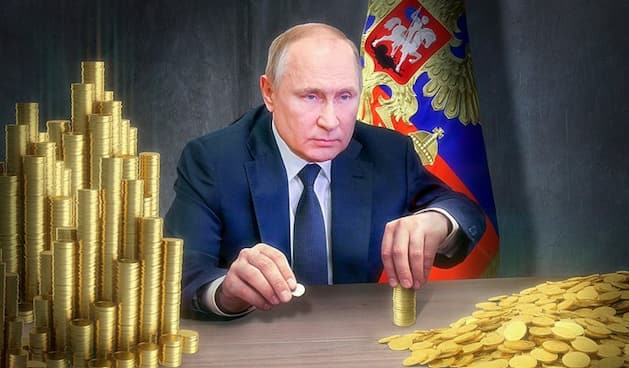After the invasion of Ukraine, the West imposed sanctions on its long-standing trading partner Russia. But these are apparently hitting the Russian economy far less hard than assumed. According to the IMF, Russia will grow even faster than Germany for the foreseeable future.
The strongest force in capitalism, as Adam Smith described it, does not come from the intentions of market participants, but from the fact that supply and demand come together in mysterious ways. The “invisible hand” was his metaphor for the elemental force at work here.
We do not know whether Vladimir Putin studied the works of the British moral philosopher. But we can say with certainty that the invisible hand renders valuable services to him. Western supply and Russian demand find each other even in times of sanctions regimes. In Russia people are consuming and not collapsing, just as vice versa the Russian raw materials find their way to customers via intricate paths.
Here are the five disturbing facts that shouldn’t exist according to western trade barriers:
The Russian financial system, which was cut off from SWIFT international payments shortly after the start of the war, has not collapsed. In the course of the war, the dollar even weakened against the ruble – the Russian currency is currently trading around 9.6 percent above the pre-war level.
The reason for this stability is that the Russian current account is rising despite the imposed lockdown and is in surplus – exports are outstripping imports, which the US cannot say for itself. This is also due to the energy prices that the West sent sky-high with its boycott decisions.
The Russian economy, like the West, experienced a dip last year and will grow again in 2023 according to the International Monetary Fund (IMF) forecast. The IMF assumes growth of 0.3 percent. In 2024, Russian growth is likely to significantly exceed German growth, says the IMF. The attempt to bring the country to its knees economically has failed. Janis Kluge, Russia expert and economist at the Stiftung Wissenschaft und Politik in Berlin, cannot help but take stock as cool:
“The Russian economy survived 2022.”
Sergei Alexashenko, former deputy finance minister of the Russian Federation, said at an event this month that 2023 will be “a difficult year” for Russia’s economy, but “no catastrophe, no collapse.”
Apple and Samsung withdrew from the Russian market at the beginning of the war, but Chinese manufacturers such as Xiaomi, Realme and Honor are now filling the gap. Turkey and, above all, China are also catching up with other goods such as washing machines or industrial goods: Overall, the Chinese exports to Russia hit a record high in December, helping to offset a sharp drop in trade with Europe.
Apple and Samsung products are now also finding their way back to Russia via the new trade routes. A study on the consequences of sanctions by the US think tank Silverado Policy Accelerator says: “Smartphones from companies such as Apple and Samsung continue to be shipped to Russia by third parties. These products are shipped to Armenia and Kazakhstan from their production sites in Asia – sometimes via Europe, Hong Kong or other countries. From there they are exported to Russia.”
Die New York Times wundert sich: „A strange thing happened with smartphones in Armenia last summer.“
Not all companies share the political will to decouple from Russia. The primacy of politics is rhetorically accepted and disregarded in day-to-day business. A study by Simon Evenett and Niccolò Pisani at the University of St. Gallen claims that not even nine percent of EU and G7 corporations have dissolved their subsidiaries in Russia.
The authors analyzed 1,404 corporations that operated a total of 2,405 subsidiaries in Russia before the war. According to the study, only 120 companies have completely written off and sold at least one local branch. 20 percent of the companies that are still active in Russia according to these criteria come from Germany.
The authors smugly conclude: “Perhaps Western politicians and business leaders are not so unanimous about the merits of decoupling.”
Business is also booming on the Russian export side. The world is still interested in the Russian raw materials, which lie dormant in abundance in the permafrost there. No sooner had the West stopped buying oil and gas than new buyers stepped in. This is also confirmed by research by Bloomberg. According to the news portal, around 2.5 million barrels of oil per day flow to Turkey, China, India and many African countries.
Despite the sanctions, Europe cannot do without Russian gas either. Countries like France, Belgium, the Netherlands and Spain still receive Russian LNG, according to the Future Gas lobby group. Germany will continue to be supplied with Russian liquefied gas via this detour – albeit only with a reduced dose.
Conclusion: The invisible hand of the market cannot be tied up, as we can see from the example of Russia and know anyway from the criminal activities of human traffickers, drug lords and arms traffickers. “Sanctions are a low cost policy,” writes Agathe Demarais in her recently published book Backfire.
The fact is that the governments print their trade bans on the official paper and cannot or do not want to control the implementation in detail. Sanctions regimes are designed to impress – the voter, not Putin.
Gabor Steingart is one of the best-known journalists in the country. He publishes the newsletter The Pioneer Briefing. The podcast of the same name is Germany’s leading daily podcast for politics and business. Since May 2020, Steingart has been working with his editorial staff on the ship “The Pioneer One”. Before founding Media Pioneer, Steingart was, among other things, Chairman of the Management Board of the Handelsblatt Media Group. You can subscribe to his free newsletter here.








